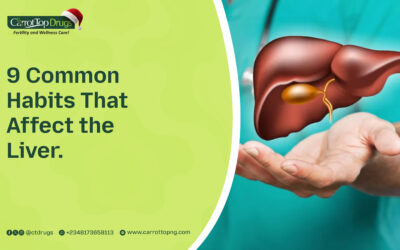Introduction
Miscarriage, a deeply distressing event, is a topic of significant concern for many women and families. Understanding the risk factors of miscarriage is crucial for both healthcare providers and those trying to conceive. This article reveals the risk factors of miscarriage and how to deal with them.
Definition of Miscarriage
The World Health Organization (WHO) defines miscarriage, also known as spontaneous abortion, as the loss of a pregnancy before 20 weeks of gestation, measured from the last menstrual period. The risk factors of miscarriage are numerous and varied, often involving a complex interplay of genetic, environmental, and lifestyle factors. This definition is widely accepted in the medical community and forms the basis for understanding and categorizing miscarriages globally.
Statistics of Miscarriage
Miscarriage is a common occurrence, affecting about 10-20% of known pregnancies worldwide. In Nigeria, the risk factors of miscarriage contribute to a significant number of pregnancy losses, though the exact prevalence is difficult to determine due to underreporting and limited access to healthcare. Abiola et al did a study that was published in 2013 on the psychological effect of miscarriage on women who attended clinics in the University of Lagos and they found out that every 1 in 3.7 pregnancies were miscarried. The American College of Obstetricians and Gynecologists in 2020 revealed that globally, the first trimester is the most vulnerable period, with approximately 80% of miscarriages occurring during this time.
Why Miscarriage Happens
Miscarriage can occur due to a variety of reasons, often related to the underlying risk factors of miscarriage. These include:
1. Chromosomal Abnormalities:
The most common cause of miscarriage is chromosomal abnormalities in the fetus, accounting for about 50% of all miscarriages. These abnormalities often occur due to errors during cell division, leading to an unviable embryo.
In humans, each cell contains 23 pairs of chromosomes—46 in total. They carry the genetic instructions necessary for development and function. During fertilization, the egg and sperm each contribute 23 chromosomes, combining to form a complete set. However, errors can occur during this process, particularly in meiosis, the specialized cell division that produces eggs and sperm.
These errors can lead to an incorrect number of chromosomes (aneuploidy), such as in Down syndrome. This means that there is an extra copy of chromosome 21, or they can cause structural defects in chromosomes. Such abnormalities may result in the embryo having too much or too little genetic material. These lead to developmental issues that the body often recognizes as non-viable, triggering a miscarriage.
Factors Contributing to Chromosomal Abnormalities
Several factors can increase the likelihood of chromosomal abnormalities:
- Maternal Age: Women over the age of 35 have a higher risk of producing eggs with chromosomal abnormalities due to the aging of their oocytes (egg cells). This is one reason why miscarriage rates are higher in older women.
- Paternal Age: Although less pronounced, advanced paternal age has also been associated with an increased risk of chromosomal abnormalities, particularly due to mutations that accumulate in sperm over time.
- Environmental Factors: Exposure to certain environmental toxins, radiation, and lifestyle factors such as smoking or excessive alcohol consumption can increase the risk of chromosomal abnormalities.
2. Hormonal Imbalances:
Hormonal imbalances play a critical role in the complex processes of conception and pregnancy. Any disruption in hormone levels can significantly increase the risk of miscarriage. Among the various hormones involved, progesterone is particularly crucial for maintaining a healthy pregnancy. When progesterone levels are inadequate, the embryo may fail to implant properly in the uterus or sustain early development. This can lead to a miscarriage.
The Role of Progesterone in Pregnancy
Progesterone, often referred to as the “pregnancy hormone,” is essential from the moment of conception. After ovulation, the corpus luteum—a temporary gland formed in the ovary—begins producing progesterone. This hormone prepares the uterine lining (endometrium) for the potential implantation of a fertilized egg by thickening it. It also makes it more receptive to the embryo.
Once implantation occurs, progesterone continues to play a vital role by:
- Supporting the Endometrium making it thick and nutrient-rich
- Preventing Uterine Contractions
- Immune System Regulation:
Consequences of Low Progesterone Levels
When progesterone levels are insufficient, the following complications can arise, leading to an increased risk of miscarriage:
- Failure of Implantation
- Luteal Phase Defect: A condition known as luteal phase defect (LPD) occurs when the corpus luteum does not produce enough progesterone. This can shorten the luteal phase (the period between ovulation and menstruation). It makes it difficult for the embryo to implant and sustain early development.
- Early Pregnancy Loss: Even if implantation occurs, low progesterone levels can lead to the breakdown of the uterine lining, as the hormone is crucial for maintaining its integrity. This can cause the pregnancy to fail in the very early stages, often before the woman even knows she is pregnant.
Other Hormonal Imbalances Linked to Miscarriage
While progesterone is central to maintaining pregnancy, other hormonal imbalances can also increase the risk of miscarriage:
- Thyroid Hormones: Both hyperthyroidism (overactive thyroid) and hypothyroidism (underactive thyroid) can disrupt the balance of reproductive hormones and interfere with ovulation, implantation, and the maintenance of pregnancy.
- Insulin and Blood Sugar Levels
- Prolactin.
3. Uterine Abnormalities:
Uterine abnormalities are structural issues within the uterus that can significantly affect a woman’s ability to conceive, sustain a pregnancy, and carry it to term. These abnormalities can interfere with the proper implantation and growth of the embryo, increasing the risk of miscarriage. Structural problems like fibroids, septate uterus, and other congenital or acquired conditions are among the key factors contributing to early pregnancy loss.
Common Uterine Abnormalities Linked to Miscarriage
-
Fibroids (Uterine Leiomyomas):
Fibroids are non-cancerous growths that develop within the muscle tissue of the uterus. They vary in size, number, and location and are a common occurrence, especially in women of reproductive age.
Impact on Pregnancy:
- While many women with fibroids have normal pregnancies, the presence of large or strategically located fibroids can disrupt embryo implantation.
- Submucosal fibroids, which grow just beneath the lining of the uterus, can distort the uterine cavity. It makes it difficult for the embryo to implant properly or inadequate blood supply to the growing fetus.
- Fibroids can also cause inflammation in the uterine lining, contributing to an inhospitable environment for the embryo and increasing the risk of miscarriage.
-
Septate Uterus:
A septate uterus is a congenital condition where a fibrous or muscular band of tissue (septum) divides the uterine cavity partially or completely into two sections. This abnormality occurs when the uterus does not fully fuse during embryonic development.
Impact on Pregnancy:
- The presence of a septum can significantly interfere with pregnancy by reducing the space available for the embryo to implant and grow.
- If the embryo implants on the septum, which has poor blood supply, it may not receive adequate nutrients and oxygen. This leads to miscarriage. Women with a septate uterus have a higher risk of recurrent miscarriages, particularly in the first trimester.
-
Bicornuate Uterus:
A bicornuate uterus is another congenital anomaly where the uterus has two cavities instead of one. It gives it a heart-like shape. This occurs when the Müllerian ducts, which form the uterus, do not fully fuse during fetal development.
Impact on Pregnancy:
- The abnormal shape of the uterus can lead to complications such as improper implantation, restricted fetal growth, or preterm labor. Women with a bicornuate uterus may experience recurrent miscarriages or difficulties carrying a pregnancy to full term.
-
Asherman’s Syndrome (Intrauterine Adhesions):
Asherman’s syndrome is a condition characterized by the formation of scar tissue (adhesions) inside the uterus. It often results from previous surgeries like dilation and curettage (D&C), infections, or severe trauma to the uterine lining.
Impact on Pregnancy:
- The scar tissue can cause partial or complete blockage of the uterine cavity, preventing normal implantation or leading to placental insufficiency. Asherman’s syndrome is associated with an increased risk of miscarriage and infertility due to the disrupted uterine environment.
-
Unicornuate Uterus:
A unicornuate uterus is a rare congenital condition where only one half of the uterus fully develops. This results in a smaller uterine cavity, which can limit the space available for fetal growth.
Impact on Pregnancy:
- Women with a unicornuate uterus often face challenges with pregnancy, including a higher risk of miscarriage of about 37% more, preterm birth, and fetal malpresentation (breech or transverse position). The reduced size of the uterus may not adequately support a full-term pregnancy, leading to complications.
Mechanisms Behind Increased Miscarriage Risk
The structural abnormalities in the uterus can increase the risk of miscarriage through several mechanisms:
- Impaired Implantation:
Many uterine abnormalities distort the shape or size of the uterine cavity, making it difficult for the embryo to implant securely in the endometrium (the lining of the uterus).
- Reduced Uterine Space:
Conditions like bicornuate or unicornuate uterus can restrict the space available for the growing embryo and placenta.
- Compromised Blood Supply:
Structural abnormalities can interfere with the normal blood flow to the uterus and placenta, which is crucial for sustaining a pregnancy. Poor blood supply can lead to placental insufficiency, where the placenta cannot provide adequate nutrients and oxygen to the fetus, increasing the likelihood of miscarriage.
- Inflammation and Scarring:
Uterine abnormalities, such as fibroids or intrauterine adhesions, can cause chronic inflammation or scarring within the uterus. This inflammatory environment can disrupt the delicate processes of implantation and placental development, making it more difficult to sustain a pregnancy.
4. Infections:
Infections like toxoplasmosis, rubella, cytomegalovirus, and certain sexually transmitted infections (STIs) can lead to miscarriage by affecting the developing fetus or the placenta.
Common Infections Linked to Miscarriage
- Toxoplasmosis:
Toxoplasmosis is an infection caused by the parasite Toxoplasma gondii, which is often contracted through exposure to contaminated food, water, or soil, or by handling cat litter.
Impact on Pregnancy:
If a woman contracts toxoplasmosis during pregnancy, particularly in the early stages, the parasite can cross the placenta and infect the fetus. This can lead to severe developmental issues, including brain damage, and increases the risk of miscarriage. The earlier in pregnancy the infection occurs, the more severe the consequences can be.
- Rubella (German Measles):
Rubella is a contagious viral infection that is typically mild in children and adults but can have devastating effects if contracted during pregnancy.
5. Immune System Disorders:
Conditions such as antiphospholipid syndrome (APS) or lupus can cause the body to mistakenly attack the pregnancy, leading to miscarriage.
Antiphospholipid Syndrome (APS)
Antiphospholipid syndrome (APS) is an autoimmune disorder characterized by the presence of antiphospholipid antibodies in the blood. These antibodies target phospholipids, which are essential components of cell membranes, including those in the blood vessels and placenta. APS is a major risk factor for recurrent miscarriages, particularly in the second and third trimesters.
How Does APS Lead to Miscarriage:
Blood Clot Formation:
One of the primary ways APS causes miscarriage is through the formation of blood clots (thrombosis) in the placenta. The antiphospholipid antibodies can trigger abnormal blood clotting, leading to reduced blood flow to the placenta. This deprives the developing fetus of oxygen and nutrients, which are critical for growth and survival. Without adequate blood supply, the pregnancy may end in miscarriage.
Placental Insufficiency:
In addition to causing blood clots, APS can lead to inflammation of the blood vessels in the placenta, further compromising its ability to function properly. This condition, known as placental insufficiency, can result in fetal growth restriction, preterm birth, or miscarriage.
Immune Attack on the Placenta:
The antiphospholipid antibodies may also directly attack placental tissues, contributing to inflammation and damage that can disrupt the pregnancy.
Systemic Lupus Erythematosus (SLE)
Systemic lupus erythematosus (SLE), commonly known as lupus, is a chronic autoimmune disease that can affect multiple organs, including the skin, joints, kidneys, and blood vessels. Lupus is associated with an increased risk of pregnancy complications, including miscarriage, preterm birth, and preeclampsia.
Mechanisms Leading to Miscarriage:
Immune System Dysfunction:
In lupus, the immune system produces autoantibodies that attack the body’s own tissues, including those of the placenta. This immune attack can lead to inflammation and damage to the placental blood vessels, disrupting the exchange of oxygen and nutrients between the mother and fetus. This disruption can result in placental insufficiency and, ultimately, miscarriage.
Antiphospholipid Antibodies:
Many women with lupus also have antiphospholipid antibodies, which increases their risk of developing APS. The presence of these antibodies can further complicate pregnancy by increasing the likelihood of blood clot formation and placental damage, as described above.
6. Chronic Health Conditions:
Chronic diseases like diabetes, hypertension, and thyroid disorders can significantly increase the risk of miscarriage, especially when they are not adequately managed. These conditions can disrupt the delicate balance required for a healthy pregnancy, leading to complications that may result in pregnancy loss.
Diabetes and Miscarriage
Diabetes, particularly when poorly controlled, poses a substantial risk to both the mother and the developing fetus.
Impact on Pregnancy:
High Blood Sugar Levels:
Uncontrolled blood sugar levels in diabetic women can lead to various complications during pregnancy. High glucose levels can impair the early development of the embryo, increasing the risk of congenital anomalies, which can be incompatible with life, leading to miscarriage. Additionally, elevated blood sugar can cause placental dysfunction, which can compromise fetal growth and lead to pregnancy loss.
Increased Risk of Miscarriage:
Women with poorly controlled diabetes are at a higher risk of miscarriage, particularly in the first trimester. The risk is also elevated in cases of gestational diabetes that develops during pregnancy if it is not managed effectively.
Complications in Later Pregnancy:
Even if miscarriage is avoided, uncontrolled diabetes can lead to other complications such as preeclampsia, preterm birth, and stillbirth, further highlighting the importance of stringent blood sugar control.
Hypertension and Miscarriage
Hypertension, or high blood pressure, is another significant risk factor for miscarriage, particularly when it is not well-controlled.
Impact on Pregnancy:
Reduced Blood Flow to the Placenta: High blood pressure can damage the blood vessels and reduce blood flow to the placenta. This can lead to placental insufficiency, where the placenta cannot provide adequate oxygen and nutrients to the developing fetus, increasing the risk of miscarriage.
Preeclampsia: Hypertension can also lead to preeclampsia, a serious pregnancy complication characterized by high blood pressure and signs of damage to other organs, usually the liver and kidneys. Preeclampsia can severely affect the placenta, leading to pregnancy loss, preterm birth, or other complications.
Chronic Hypertension: Women with chronic hypertension (high blood pressure that existed before pregnancy) are at an increased risk of miscarriage, especially if the condition is severe or poorly managed.
Thyroid Disorders and Miscarriage
Thyroid disorders, including both hypothyroidism (underactive thyroid) and hyperthyroidism (overactive thyroid), can significantly impact pregnancy outcomes if not properly managed.
Impact on Pregnancy:
Hypothyroidism: An underactive thyroid can lead to low levels of thyroid hormones, which are critical for fetal development, especially in the early stages of pregnancy. Untreated hypothyroidism can increase the risk of miscarriage, as well as other complications such as preterm birth and developmental delays in the baby. Inadequate thyroid hormone levels can impair implantation and placental development, leading to pregnancy loss.
Hyperthyroidism: An overactive thyroid, on the other hand, can lead to an excess of thyroid hormones, which can also be harmful during pregnancy. Uncontrolled hyperthyroidism increases the risk of miscarriage, as well as other complications like preeclampsia and preterm birth. It can also cause fetal growth restriction and heart failure in severe cases.
Autoimmune Thyroid Disease: Autoimmune thyroid conditions, such as Hashimoto’s thyroiditis (associated with hypothyroidism) or Graves’ disease (associated with hyperthyroidism), can also contribute to an increased risk of miscarriage due to the body’s immune response attacking the thyroid gland and potentially affecting the pregnancy.
7. Lifestyle Factors:
Smoking, alcohol consumption, and drug use are well-documented risk factors of miscarriage. These substances can harm the developing fetus and increase the likelihood of pregnancy loss.
Risk Factors for Miscarriage
Understanding the risk factors of miscarriage is crucial for identifying at-risk pregnancies. Key risk factors include:
- Advanced Maternal Age: Women over the age of 35 are at a higher risk of miscarriage due to a decline in egg quality and an increased likelihood of chromosomal abnormalities (Rai & Regan, 2018).
- Previous Miscarriages: A history of one or more miscarriages significantly increases the risk of subsequent miscarriages, with the risk rising after each additional loss.
- Obesity: Obesity is a significant risk factor of miscarriage, as it can lead to hormonal imbalances, insulin resistance, and other metabolic issues that affect pregnancy.
- Environmental Exposures: Exposure to environmental toxins, such as pesticides, heavy metals, and radiation, can increase the risk factors of miscarriage by causing genetic mutations or disrupting hormonal balance.
- Poor Nutrition: Deficiencies in essential nutrients, such as folic acid, iron, and vitamin D, can compromise fetal development and are recognized risk factors of miscarriage .
- Inadequate Prenatal Care: Lack of access to or utilization of prenatal care can prevent the early detection and management of complications, increasing the risk factors of miscarriage .
- Chronic Stress: High levels of stress and anxiety have been linked to an increased risk of miscarriage, possibly due to hormonal imbalances or immune system dysfunction.
How to Avoid Miscarriage
While not all miscarriages can be prevented, understanding and addressing the risk factors of miscarriage can reduce the likelihood of occurrence. Preventative measures include:
-
Preconception Health Check:
Women planning to conceive should undergo a thorough health assessment to identify and manage any underlying conditions that could be risk factors of miscarriage.
-
Healthy Lifestyle Choices:
Avoiding smoking, alcohol, and illicit drugs, as well as maintaining a healthy weight, can significantly reduce the risk factors of miscarriage.
-
Proper Nutrition:
A balanced diet rich in essential vitamins and minerals, particularly folic acid, can support a healthy pregnancy and mitigate the risk factors of miscarriage.
-
Regular Prenatal Care:
Early and consistent prenatal care is vital for monitoring the pregnancy and addressing any emerging complications that could be risk factors of miscarriage.
-
Stress Management:
Incorporating stress-reducing techniques such as yoga, meditation, and adequate sleep can help lower the risk factors of miscarriage associated with chronic stress.
-
Management of Chronic Conditions:
Women with chronic health conditions should work closely with their healthcare providers to manage their conditions and reduce the associated risk factors of miscarriage.
-
Vaccination and Infection Prevention:
Ensuring that vaccinations are up to date and taking precautions to avoid infections can reduce the risk factors of miscarriage.
-
Taking Supplements:
If you are pregnant, we recommend that you take supplements like Evergreen Natal Care Plus. It contains the recommended vitamins, minerals, and nutrients in the right proportion to maintain a safe and healthy pregnancy.
If you are older and trying to get pregnant, you should go for fertility supplements such as Evergreen Eggboost. Evergreen EggBoost is a reproductive support dietary supplement that contains a combination of vitamins and antioxidants which have been scientifically proven to improve the quality of a woman’s egg. It helps the egg cells produce the energy needed for successful conception and implantation.
You should go for Evergreen Formular for Women also. It balances your reproductive hormones and optimizes the reproductive tissues for pregnancy to occur. You should get Evergreen CM as well. Evergreen CM is a cervical mucus supplement which can strengthen the uterine lining in preparation for pregnancy.
Conclusion
Miscarriage is a complex and multifaceted issue, with various risk factors of miscarriage contributing to pregnancy loss. While some factors, such as age and genetics, cannot be altered, many others can be managed through lifestyle changes, medical interventions, and proper prenatal care.
FAQs
- What are the most common risk factors of miscarriage?
The most common risk factors of miscarriage include chromosomal abnormalities, advanced maternal age, hormonal imbalances, and lifestyle factors such as smoking and alcohol use.
- Can stress increase the risk factors of miscarriage?
Yes, chronic stress is among the recognized risk factors of miscarriage, potentially due to its effects on hormonal balance and immune function.
- How does age influence the risk factors of miscarriage?
Advanced maternal age, particularly over 35, significantly increases the risk factors of miscarriage due to a higher likelihood of chromosomal abnormalities and reduced egg quality.
- Are previous miscarriages a risk factor for future miscarriages?
Yes, having one or more previous miscarriages is a significant risk factor of miscarriage in future pregnancies.
- Can lifestyle changes reduce the risk factors of miscarriage?
Yes, adopting a healthy lifestyle, including avoiding smoking, alcohol, and managing stress, can reduce the risk factors of miscarriage .
- Is it possible to prevent miscarriage entirely?
While not all miscarriages can be prevented, addressing the risk factors of miscarriage can reduce the likelihood of pregnancy loss.
- What role does prenatal care play in managing the risk factors of miscarriage?
Regular prenatal care is crucial for monitoring and managing the risk factors of miscarriage, helping to detect and address potential issues early on.

















